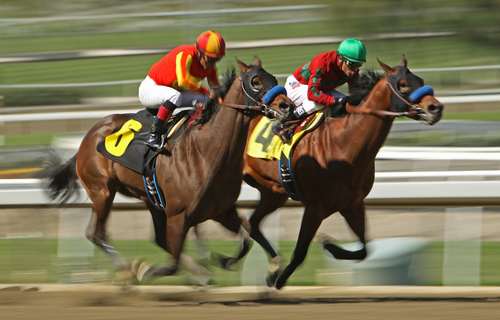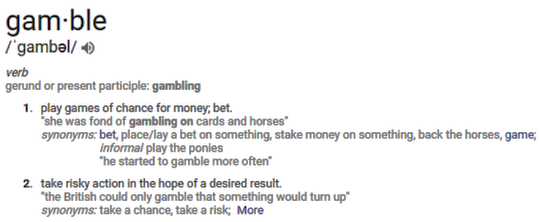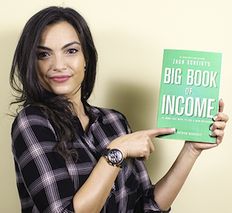
Seth Klarman "Triple Crowned" His Portfolio
This past weekend, just a 6.3 mile drive from our headquarters in Baltimore, a hometown hero was crowned.
In case you missed it, Cloud Computing — a horse owned by Baltimore-raised hedge fund manager Seth Klarman — won the 142nd Preakness at the wire.
The prize? A cool $900,000 purse… Not to mention the Woodlawn Vase, the notoriety, and fame.
Today, I want to show you how Seth Klaman — and other notable investors — make millions from “gambling.” And how you too can play the odds and profit from betting markets…
Life is a gamble — or so the popular phrase tells us.
I concur.
And I would take the phrase a step further and say that financial markets, investments, and even savings require you to “gamble.”
But the term doesn’t have to be a bad thing. As long as you understand the odds and probabilities.
Now I’m a conservative guy. I don’t like to take excessive risks. I’m the provider for a big family, and it’s important that I make wise financial decisions. You probably have a similar mindset when it comes to your family’s finances.
So let me explain what I mean when I say “‘gambling’ doesn’t have to be a bad thing.”
“Gambling” is a Matter of Perspective
Cloud Computing was an underdog, handicapped at 13-to-1 to win. And yet, coming down the stretch, Cloud Computing turned on the afterburners, chasing down three horses in front of him, to win a photo-finish race by no more than a few inches.
The crowd went crazy!
And anyone who bet $1,000 on the underdog horse wound up cashing in their tickets for $13,000. Not a bad return for a Saturday afternoon!
On a larger scale, Baltimore-raised hedge fund manager Seth Klarman and his business partner collected nearly $1 million in prize money from the race.
That’s a pretty good return for the $200,000 these two originally paid to buy Cloud Computing
For Klarman, horse racing is simply a hobby that he has enjoyed ever since seeing his first horse race outside Baltimore as a child.
But I have to believe that the fact that Klarman has been so successful betting on horses — and betting on markets — has a lot to do with his upbringing.
You see, Klarman’s father taught Economics at Johns Hopkins. And despite what you may think, economics and “gambling” go hand in hand.

Source: Google
The term “gamble” simply means to bet money on a game of chance. In the society I grew up with, gambling was considered an irresponsible waste of money. And for many Americans, gambling really is a destructive habit.
That’s not the type of gambling I’m advocating today.
Instead, think about what happens if you bet money wisely, while having a very good grasp of the odds and the probabilities that you’re betting on.
That’s exactly how professional “gamblers” — along with Wall Street investors — make money.
And this perspective is very important for investors to understand.
Notable “Gamblers” in Wall Street’s Casino
Did you know that Seth Klarman isn’t the only successful gambler on Wall Street?
In 2012, legendary investor David Einhorn came in third place in the World Series of Poker’s “Big One for One Drop” tournament, winning over $4.3 million.1 (Einhorn later donated his profit to the Michael J. Fox Foundation.)
Einhorn made it to third place in this poker tournament by deftly calculating his probability of winning specific poker hands, and comparing those probabilities to the odds he was getting on each bet.
In other words, Einhorn used economics and statistics to determine whether each bet — or “gamble” — was worthwhile.
Warren Buffett is also a “gambler,” known for regularly playing bridge with other big-time betters such as Bill Gates.
We'd like to rush a FREE copy of Zach Scheidt's new book to your doorstep, ASAP.
For generations, the thought of retirement filled workers with anticipation. The American dream was to work hard, be financially responsible and enjoy your golden years with friends and family. But for too many retirees, this dream has become a nightmare. And while the challenges for retirees are real, there are many alternative ways to generate extra income. The Big Book of Income will help you build your wealth and retirement, so you can focus on the things that really matter! Sign up for The Daily Edge e-letter today and learn how to claim your copy of this best-selling author's new book..
We will NOT share your email address
Buffett even hosts his own private poker tournament, the NetJets Poker Invitational, with a prize pool of $500,000.2 The tournament is hosted at the Wynn poker room in Las Vegas. The same room where I played a few hands last week while in town for the Money Show investment conference.
The attraction of “gambling” — whether on horses like Seth Klarman, or on poker like Einhorn and Buffett — comes not from the childish rush of winning money from hitting a jackpot.
Instead, it’s an enticing exercise in calculating the probability of winning, and cashing in a profit if you’re right!
A Quick Example of “Positive” Gambling
To understand how this concept of “gambling” can actually be rational and profitable, consider this poker scenario.
You’ve got two tens — a decent holding — and your opponent bets $250 at the end of a hand.
There’s already $500 in the “pot.” So if you call his bet and win, you’ll receive $750 total. If you lose, you’ll forfeit the $250 that you’re betting.
You’ve played with your opponent for some time, and you know he likes to bluff. In fact, you estimate there is about a 50% chance that your hand is “good” and that you will win.
Should you call his bet?
The answer is, absolutely yes!!
That is, assuming your estimate is correct.
If there really is a 50% chance that he’s bluffing, then you’re getting paid a very handsome profit to call this bluff every time.
If you run this identical scenario 100 times, you’ll win 50 of the conflicts pocketing $37,500 in total. (That’s 50 times $750 in profit). Of course you’ll lose 50 of the conflicts as well, forfeiting $12,500 in total. (That’s 50 times the $250 bet that you call.)
Altogether, you can expect to win $25,000 if you call a similar opponents bet in 100 different instances.
And that’s what professional betting is all about!
Calculating your probability of winning, and determining if you’re getting paid enough to take the risk.
Betting Markets, Financial Markets and “Positive EV”
In the poker world, there’s a term called “Positive EV” or “Positive Expected Value.”
This term simply means that if you run a similar scenario several times, you can expect to make money in total. To a professional gambler, it doesn’t matter what happens in this one instance. What matters is whether you make a “positive EV” bet that will make money over time.
Outside of traditional “gambling” arenas such as sports betting and poker, there are plenty of other areas to use this concept to make money.
Instead of using offshore “betting accounts,” I’m suggesting you make wise bets in the financial markets.
For instance, “betting” on bank stocks, infrastructure companies, and pharma firms would have been a great way to “gamble” on Trump winning the presidency. And “betting” on a major stock selloff following the “Brexit” vote would have given you a chance to lock in some big short-term gains.
When the odds you are receiving on a bet far outweigh the probability of a win, it can be a very good idea to bet — or invest — for a specific outcome.
So you see, these concepts apply just as well to business and the stock market as they do to traditional gambling.
Investment decisions… business decisions… heck, even life decisions are full of uncertainty. You can never know for sure if a single decision will pay off or not. That’s the uncertain world that we live in.
But carefully thinking about probabilities, and the long-term benefits of returning “positive EV,” will go a long way in helping you turn a profit.
May the odds ever be in your favor!
Here’s to growing and protecting your wealth!

1Event 55: $1 Million Big One for One Drop, Poker News, Don Peters
2Inside Warren Buffett’s Private Poker Game, Forbes, Randall Lane
2Inside Warren Buffett’s Private Poker Game, Forbes, Randall Lane
Ed. Note: Get daily insight, insider scoops and actionable investment tips six times a week with The Daily Edge! Just click here for a FREE subscription!


No comments:
Post a Comment